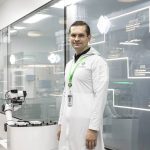- Lung cancer is the leading cancer killer in the United States, in large part due to late diagnosis.
- People of Color with lung cancer are less likely to receive an early diagnosis and more likely not to receive any treatment compared with white people.
- Actor Laura Dern teamed up with the American Lung Association to raise awareness and funds for lung cancer.
Academy Award winner Laura Dern recalls vivid childhood memories of her grandfather battling lung cancer.
“At the time, I was living with him and my grandmother through the hardest year of his lung cancer, and then he passed away, so the memories are strong,” Dern told Healthline.
In addition to the grief of losing him when she was 6 years old, Dern said the lack of education around lung cancer that her grandfather faced stays with her.
“[He] had the misguided understanding that when he was having coughing attacks that maybe if he smoked a cigarette, it would help clear his throat, and I remember him telling my grandmother that as a kid. They just didn’t know,” Dern said.
In 2014, her connection to lung cancer grew stronger when she worked on the film “Wild,” a movie about a woman who died from the disease.
The film was an adaptation of the book “Wild: From Lost to Found on the Pacific Crest Trail” by Cheryl Strayed. Dern played Strayed’s mother in the movie, and during the filming, the women bonded over their common loss.
“For any artist, our job is to reflect the human condition, so knowing what all people are walking through and what their experience is is deeply impactful… Here was a wound I experienced as a little girl, and there I [was] making a film about the specific subject matter of lung cancer,” Dern said.
A year after making the film, Dern learned about the American Lung Association (ALA) through her mother’s friend, actor Valerie Harper, who was involved with the association while she lived through her own lung cancer diagnosis.
“I felt lucky and privileged to learn more and be more involved, and felt it could be an honor and service to Valerie, as well to do any work I could to be involved in the ALA,” Dern said.
In 2015, she joined forces with the ALA’s LUNG FORCE initiative, which unites women and their loved ones across the country to stand together for lung health and against lung cancer.
Her latest endeavor is hosting a LUNG FORCE Walk team to raise funds for lung cancer research. Anyone can join her team virtually or sign up for a local walk.
“[Instead] of feeling powerless, [you can feel] powerful as an individual that you can do something, you can advocate, you can help raise awareness, you can help raise funds for research and education,” Dern said.https://www.youtube.com/embed/IHRJoN8t0_o?enablejsapi=1&origin=https%3A%2F%2Fwww.healthline.com&widgetid=1
Breaking disparities among People of Color
As part of her role with the ALA, Dern hopes to raise awareness and funds to break health disparities.
According to the ALA, People of Color with lung cancer are less likely to receive an early diagnosis and more likely not to receive any treatment compared with white people.
Dr. David Tom Cooke, spokesperson for the ALA, said that the ongoing effects of systemic racism, inequities, and segregation play a role in health disparities overall. He points to the following historical inequalities as contributing factors:
- difficult living conditions
- targeted tobacco marketing, such as menthol flavored products
- inequitable exposures to air pollution
- disproportionate societal stress
- lack of access to affordable, quality healthcare and nutrition
“Sadly, as the 2020 State of Lung Cancer illustrated, these disparities also result in poorer lung cancer patient outcomes for many communities of color,” Cooke told Healthline.
He said health promotion and advocacy can help reduce health disparities, and points to the ALA’s work at both the state and federal level to ensure that all people with lung cancer have access to quality and affordable healthcare coverage.
“In addition to funding lung cancer research, we also advocate for research funding at the National Institutes of Health so that there can be better detection, treatments, and cures for all those impacted by lung cancer,” Cooke said.
Source:https://www.healthline.com/health-news/how-lung-cancer-changed-laura-derns-life#Improvements-in-treatments-and-screening-help-save-lives






